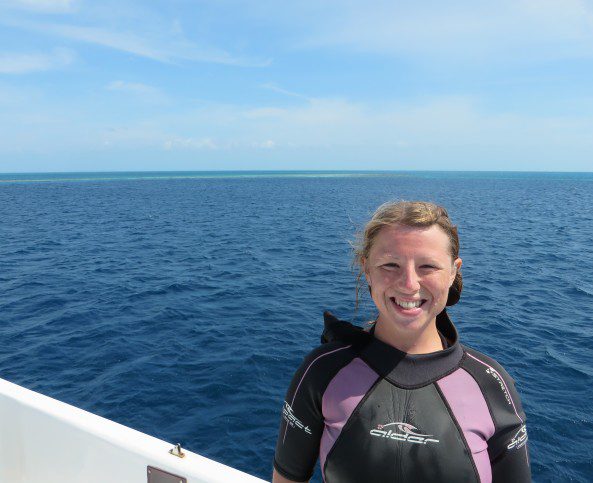In the latest instalment in our series of staff Q&As, we ask Winnie Courtene-Jones, Field Scientist, Belize, some searching questions about science, conservation and superpowers…
What is your academic/professional background?
From a very early age I was fascinated by the natural world, it was therefore an obvious choice for me to study a BSc in Zoology and Animal Behaviour. I have always had an interest in the marine environment, learning to dive and seeing the incredible diversity of life below the waves only increased this passion. After travelling and working on a range marine projects, I completed a MRes in marine biology before starting with Blue Ventures.
Why do you do what you do?
For lots of reasons; my passion for the sea, my curiosity and desire to learn more and more about the marine ecosystem has taken me down a scientific research career path and led me to where I am now. The current state of the oceans isn’t looking all that bright, and I hope that I can do my bit to help ensure a healthier and more sustainable future.
What is the best/worst thing about being a field scientist
Being a field scientist is never boring, and it really keeps you on your toes. The best thing is how varied the job is; carrying out different surveys, seeing an incredible range of species, working with great people, and having experiences that will last a lifetime. Every day is different and there’s nothing better than waking up on a beach every morning excited for what the day holds!
I don’t know what the worst thing is; diving with lots of equipment maybe: slates, transect reels, SMB….. but when you get to see amazing sights it puts it all in perspective

What do you enjoy most about your job?
While I enjoy working on the logistics of a project and developing methods, for me nothing compares to being out in the field carrying out research. Knowing that I am helping to collect valuable data which is being used to make informed decisions and influence conservation is the most satisfying part of being a field scientist.
What is your favourite species and why?
This is a hard one, Belize has some amazing species in its waters, seeing nurse sharks, bottlenose dolphins, loggerhead and hawksbill turtles is an incredible experience and I always feel privileged to have such awe-inspiring encounters. I do, however, have a soft spot for all the slightly unusual looking fish, such as the smooth trunkfish, scrawled cowfish, spotted drum and sharpnose puffer. I especially love showing volunteers these species and emphasising the amazing diversity of fish in these waters.
What would your scientific superpower be?
I feel that one of the biggest problems facing the seas currently is plastic pollution. Microplastics outnumber plankton by as much as 7:1 in some areas. These have many impacts on marine life through ingestion, entanglement, or by releasing organic pollutants into the water. My superpower would be the ability to soak up all the plastics in the ocean.
What is one of the strangest things that has happened to you while working in conservation?
Working in different countries you are faced with many unusual things; bizarre marriage proposals, being offered weird local foods such as whole sun-dried rat on a stick in Malawi, being crammed into tiny buses with more people, chickens and goats than you ever thought was possible. Having all forms of public transport regularly break down, pushing and pulling stuck cars out of mud and getting covered in the process. On a personal note I never imagined myself sticking my fingers down a lionfish’s throat to make sure I extracted all of its stomach contents for analysis, but it does seem to happen on a regular basis!

